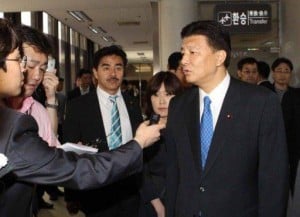
- Yoshitaka Shindo, right, Tomomi Inada, center, and Masahisa Sato, rear, talk to media at Gimpo Airport in Seoul Monday.
Three Japanese lawmakers from the Liberal Democratic Party pushing Tokyo’s claims to the Liancourt Rocks were denied entry to South Korea Monday.
The three lawmakers were Yoshiktaka Shindo, the grandson of a general in the Imperial Japanese Army; Masahisa Sato, a former member of the military; and Tomomi Inada, who denies the 1937 Rape of Nanjing (she would be the Japanese equivalent of a Holocaust Denier).
Protesters outside of Gimpo Airport in Seoul held signs reading, “Stop Japan!” and “You die!”
After being denied entry, the three refused to leave the country, but eventually gave up and flew home at 8:10 p.m.
Their actions come after Korean Air held a test flight over the disputed islands. Tokyo placed a once-month ban on Korean Air for all public employees, and the three lawmakers planned a visit to nearby Ulleung Island as a show of protest.
Shindo said: “South Korea has illegally and militarily occupied part of what is undoubtedly our territory. We don’t intend to fight there. We want to express our feeling of anger to the South Korean people.”
Japanese government spokesman Yukio Edano said, “We have informed them that it is deeply regrettable that South Korea took such action against the lawmakers from our country.”
I think both sides are acting rather childishly on the issue. If Japan wanted to have a serious dialogue on the issue, the government should not have allowed three controversial lawmakers to go to South Korea to represent Tokyo in an official capacity. On the other hand, as they were delegates from a neighboring nation with normal diplomatic relations, Seoul should have allowed the three entry.
The U.S. recognizes Japan’s claims over the islands, but has distanced itself from the dispute in recent years.